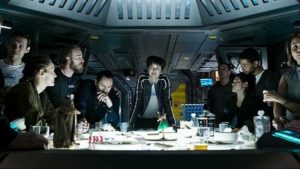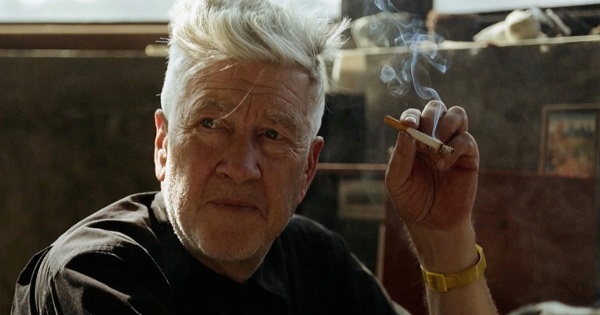 In late October of last year, I did what many joke and pride themselves about: binge an entire TV series on Netflix in a week. With a new season just released, complete with teaser images and episode descriptions that were beckoning my sci-fi/horror interests like a siren, Charlie Brooker’s Black Mirror called to me. I first thought of it as a show I could simply watch at the end of the day, relaxing after long hours of caring for my newborn daughter.
In late October of last year, I did what many joke and pride themselves about: binge an entire TV series on Netflix in a week. With a new season just released, complete with teaser images and episode descriptions that were beckoning my sci-fi/horror interests like a siren, Charlie Brooker’s Black Mirror called to me. I first thought of it as a show I could simply watch at the end of the day, relaxing after long hours of caring for my newborn daughter.
I was wrong. It was not simple, and relaxation was scarce in those evenings of binging. Black Mirror etched its dark tales of human depravity and gone-too-far technology into my mind, and the scar remains there to this day. Since that time, I hadn’t seen anything that stood up to Brooker’s prophetic warnings regarding the tragic meshing of human creation and sin until last week, when Sir Ridley Scott’s latest chapter in the Alien universe was unleashed in theaters around the globe.
Alien: Covenant takes place eleven years after the events of the Prometheus mission in 2012’s Prometheus. Our protagonists aboard the colonization ship Covenant are on a mission to populate the universe, and in a way, this reflects Scott’s current status for his original work that put him on the map in 1979. With two more films planned for this prequel series, it’s clear that Scott wants to tell a grander story, leading up to the events experienced on the Nostromo in Alien. After the events of Covenant, we now have a good idea of the kind of story Scott is telling.
After a jarring electrical burst which leads to the early deaths of some colonists, Walter (Michael Fassbender) – a newer synthetic resembling David, who served on the Prometheus mission years ago – orders the ship’s computer to wake the Covenant crew from sleep stasis. As the crew begins to repair the ship, they receive a transmission from a nearby planet which hasn’t been discovered yet for reasons unknown. But as the crew runs scans on the planet, they find it’s better suited for colonization than the planet they were originally traveling towards. Fighting impatience, curiosity, and despair, most of the crew coerces the captain into investigating the planet to see if it truly is suitable for life.
 Soon enough, and much to their dismay, the crew does confirm that life exists on the planet – just not the kind of life that they would enjoy sharing living spaces with. And as chaos erupts, it is David who emerges from the shadows, saving the colonists. It’s at this point that Alien: Covenant truly blasts off, turning from a paint-by-numbers horror flick into something much deeper and sinister. Along with learning about what happened to Dr. Elizabeth Shaw and David in the Engineer’s ship post-Prometheus, Scott gives us something he hasn’t explicitly given us before in his Alien films – communication and action between two synthetics who are similar in appearance, yet opposed in worldview.
Soon enough, and much to their dismay, the crew does confirm that life exists on the planet – just not the kind of life that they would enjoy sharing living spaces with. And as chaos erupts, it is David who emerges from the shadows, saving the colonists. It’s at this point that Alien: Covenant truly blasts off, turning from a paint-by-numbers horror flick into something much deeper and sinister. Along with learning about what happened to Dr. Elizabeth Shaw and David in the Engineer’s ship post-Prometheus, Scott gives us something he hasn’t explicitly given us before in his Alien films – communication and action between two synthetics who are similar in appearance, yet opposed in worldview.
It’s odd to even speak about synthetics or robots espousing worldviews, but such is life in Scott’s imagined year of 2104. Since the events of Prometheus, David has evolved into a much more complex being, one that is enlightened and extremely intelligent, but has fallen into a dark, insidious state. We see through David’s recollections that he has committed atrocities that parallel the ones committed by the beings he bears image to. From annihilating entire species to performing Lovecraftian experiments while engineering monsters of his own, David repeats Nietzschean rhetoric as he attempts to convince Walter to join and rule with him in a fashion not unlike Darth Vader to Luke Skywalker in The Empire Strikes Back.
 As it was with the title of Prometheus, the title of Alien: Covenant is loaded with meaning that should force the audience to think beyond the covenant of marriage, even though the colonization ship was full of married couples. But what commitments have the humans and synthetics made, and to whom? Both David and Walter were created to commit to human bidding, but as both of Scott’s Alien prequels show, David breaks that agreement on a regular basis, his curiosity and need to create overwhelming his original programming. We see that the crew of the Covenant is bonded to their technology, believing that the unknown planet was promising enough to divert from their original course, all from just an external scan of the physical qualities of the planet. The crew consistently trusts their technological advancements such as their spaceship, their weapons, and their synthetics – all of which fail them on countless occasions. While they use this imperfect technology to seek, protect, and create new lives for themselves, they don’t realize until it’s too late that their own creation – David – desires new life as well.
As it was with the title of Prometheus, the title of Alien: Covenant is loaded with meaning that should force the audience to think beyond the covenant of marriage, even though the colonization ship was full of married couples. But what commitments have the humans and synthetics made, and to whom? Both David and Walter were created to commit to human bidding, but as both of Scott’s Alien prequels show, David breaks that agreement on a regular basis, his curiosity and need to create overwhelming his original programming. We see that the crew of the Covenant is bonded to their technology, believing that the unknown planet was promising enough to divert from their original course, all from just an external scan of the physical qualities of the planet. The crew consistently trusts their technological advancements such as their spaceship, their weapons, and their synthetics – all of which fail them on countless occasions. While they use this imperfect technology to seek, protect, and create new lives for themselves, they don’t realize until it’s too late that their own creation – David – desires new life as well.
Much like the final shots of Black Mirror’s episodes, I find it hard to shake the last images of Covenant. As a synthetic places his newly-engineered creations alongside a developing human embryo in the closing moments of the film, I felt sick to my stomach – something I’ve never quite felt in a canonized Alien film. While many will be frightened of the usual Neomorph and Xenomorph “alien attack” scenes – and yes, there’s plenty of those – the real terror blankly stares back at us with our own features. By anchoring his tale to Fassbender’s fantastic leading performances, Ridley Scott has given us quite the warning. When we trust in our creations to give us purpose and life instead of our own Creator, we forget the most important relational covenant of all between God and Abraham found in Genesis – that which promises abundant life. In Alien: Covenant, humanity’s creation known as David has a covenant with his perfect organism as well – the promise of death to all who encounter it. Covenant leaves us with a question that even now our news headlines ask; we know what to do with our technology, but what will our technology inevitably do to us?


